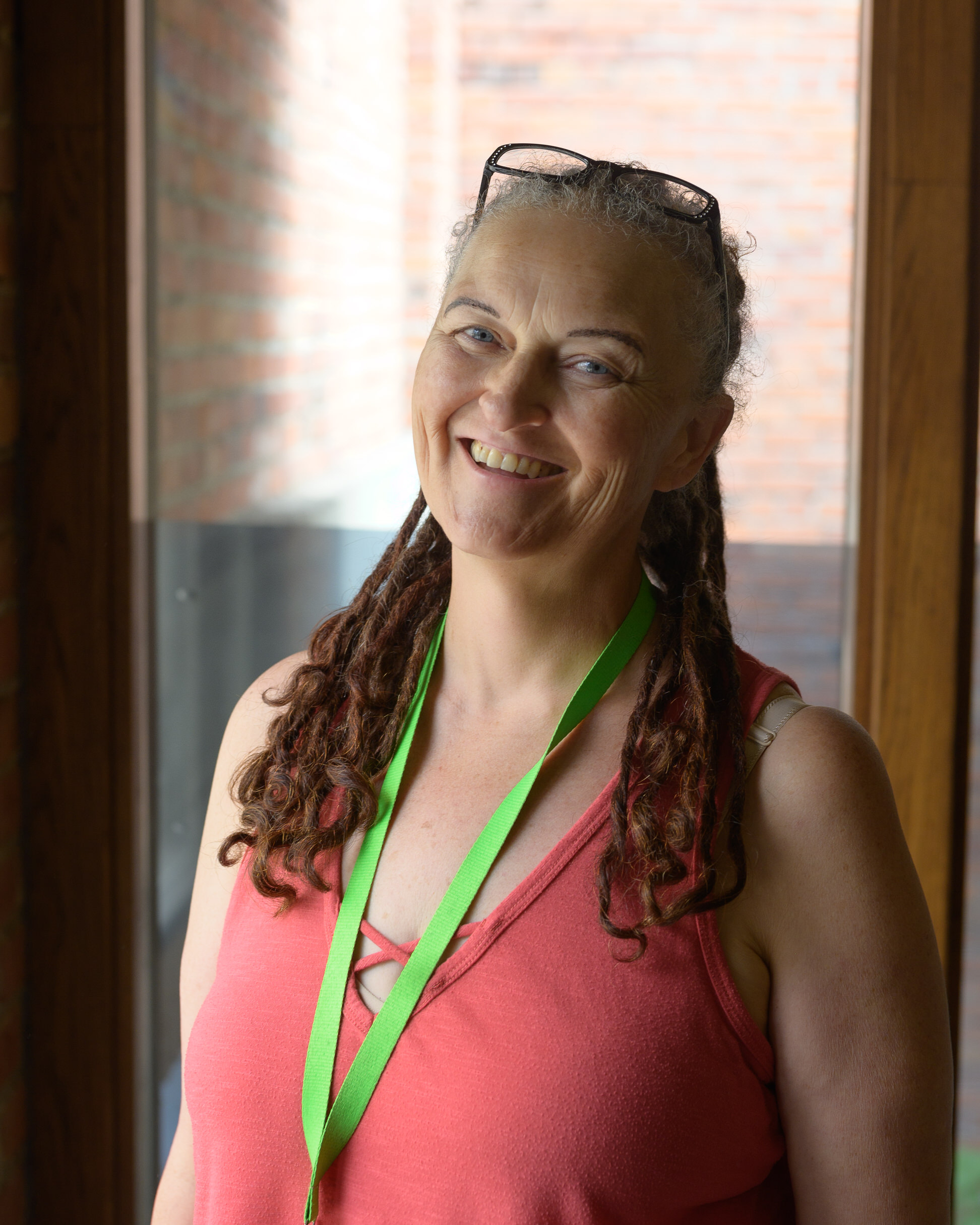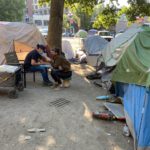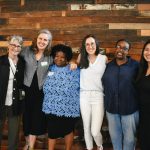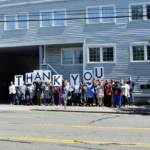
Photo credit: Ted Zee for Evergreen Treatment Services
Housing is a complex process. We spoke with Bonnie Rico, a Housing Specialist with REACH, to learn more about what it takes to house someone, the Foundational Community Supports program, and what harm reduction looks like in her work.
Tell us a bit about yourself and how you came to work with REACH?
I’m a late bloomer in social services. After graduating college, I was in my forties, and I had no idea what I wanted to do. I didn’t know I could go out, talk to people, become their friend, help them, and get paid for it.
I started out in homeless outreach at a mental health agency in Tacoma, then moved into shelter work where I was a supervisor. I did not like that job at all. Then a friend who worked at REACH convinced me to come to Seattle to work with them. So, I made the leap. I came to REACH and have no regrets! This is such a wonderful place to work where people truly care. Not just about our clients; we care about each other. Supervisors care about us, we care about our teams, and that is reflected in our work with clients. I refuse to work at a place that doesn’t have a warm and inviting work culture. So here I am, and I’m happy to be here.
To help people, we need to make sure that our cup is also filled. ETS certainly works to build a caring and compassionate workplace culture. Could you tell us a bit about your role as a Foundational Community Support (FCS)Housing Specialist?
Working specifically with FCS makes the details of my role a little different than other housing case managers, but basically, anything and everything that has to do with housing someone is my responsibility. From meeting them where they are physically—if they’re in a tent on the sidewalk, for example—to helping them into the kind of housing that works best for them. Some clients want to rent a room, because they know that’s all they can afford, and they may have people they want to remain close to. Other clients want their own apartment because they want to be independent. Just like all people, our clients have very specific needs or wants around housing. I work with them so that they can realize that goal.
Then, the real work begins. Housing is complex. First, we support their transition from where they were before to their new place. Then, they have to adjust and stay in this new place. Adapting to a new home comes with emotional challenges. There are also logistics to becoming a tenant. All those little things like hanging curtains and pictures and having cleaning supplies, I help people with that, too. Once their basic needs are met, together we imagine bigger goals. What do you want to do? Do you want to go to school? Do you want to get a job? Do you want to volunteer at your local food bank? When people have been too busy surviving, they don’t always know what else to want—I love helping our clients visualize what more they could want for themselves.
Housing is complex–and it’s foundational to people’s health. There are so many different aspects of your work that are so important to the clients. You mentioned FCS, could you tell us more about the program?
Foundational Community Supports is a program billed through Medicaid. So instead of working off grants, I bill my work through Medicaid. That means I have money behind my program, which I didn’t have before. The program allows me to work with clients who might otherwise fall through the gaps because they do not have intensive case management, especially around housing.
If a client qualifies for Medicaid and has a health factor and a risk factor, then I can work with them! A health factor is like a substance use disorder or mental health diagnoses. A risk factor can be chronic homelessness, exiting prison or jail, in or leaving rehab, leaving the foster care system, and similar circumstances. But since I work with REACH, almost everybody who our team qualifies because they’re chronically homeless.
That’s so interesting! That means you don’t have to fundraise, because there’s already a budget built in?
Exactly. A lot of people don’t know about this program. I believe ETS is trying to start an FCS program because for now I’m the only housing case manager working with the program. I’m trying to build a team. That’s my goal.
ETS is committed to a harm reduction philosophy when working with clients. What does harm reduction mean to you and what does it look like in your role?
With housing, harm reduction has to do with where clients are living and how to ensure their safety. It may be an odd example, but it helps people understand how staying safe while living outside requires many considerations others do not think about; I have stand up urinals for people who would not normally stand up when using the bathroom. I mentioned it to a client, and she was so interested! She wanted one so that she wouldn’t have to leave her tent at night or risk going outside and getting arrested for indecent exposure. That’s harm reduction!
With clients living outside, paperwork and identification are so important. I taken a lot of pictures of people’s IDs in case they are lost or misplaced. I have a client who I’ve helped get several IDs, but they are always lost. So, I’ve taken a picture of his ID, given him a copy, and I put it inside a card holder, so it won’t get wrinkled. Now, he can use it at the pawn shop, he can apply for housing. That is harm reduction!
Harm reduction can be hard for people to imagine, but your examples make it so clear. It’s about safety. We also want to discuss what success can look like in your role. In the last few months, you have had success with a client, Jose, where you attended the lease signing to his new apartment. Can you walk us through a little bit about what the process was like?
This has been a process for Jose. In the last few weeks, he has officially moved into the apartment and I was able to order him a bed with FCS TAP funds. This happened after a few months of navigating this change.
Signing a lease is a lot easier than other parts of the housing process. Finding a place that meets the client’s needs can take time, then applying doesn’t always guarantee housing. Also being a tenant is something our clients learn, and sometimes it’s a challenge. In Jose’s case, he wanted to live in West Seattle and there was an apartment complex we could have applied for, but the management was not happy with some of our clients and unlikely to agree to accept more. Still, we kept trying.
We found a place with a vacancy and knew the date it would be available. Jose had to be present on that date to apply. We spoke a week before, and I had to hope he was there on the day of because phones calls aren’t always reliable. But I found him that day, we applied, and he got it!
Then, the harder part began. After signing, I went to meet him to buy some necessities for his place and picked him up at his encampment. He wasn’t quite ready to move into the apartment. This is what I mean by housing is complex. He wanted this place, but he wasn’t comfortable inside four walls. He had more safety now, but he still worried about what he left at the encampment: his partner. We discussed whether she could stay with him for a few days to help him feel more comfortable, but that wasn’t an option. If she stayed with him, people would take her space at the encampment, and she could lose her belongings. That’s scary when you’re unhoused, and you work so hard to get things.
This is a common experience. It was important for me to have a lot of empathy for him throughout this process, because he needed to navigate a big change on his own terms. All I could do was offer suggestions, stick with him, and hope he took a leap of faith.




